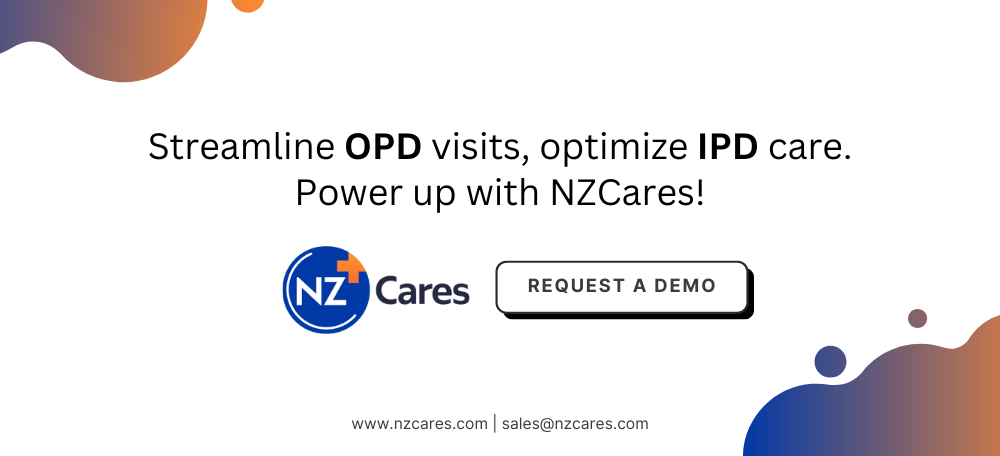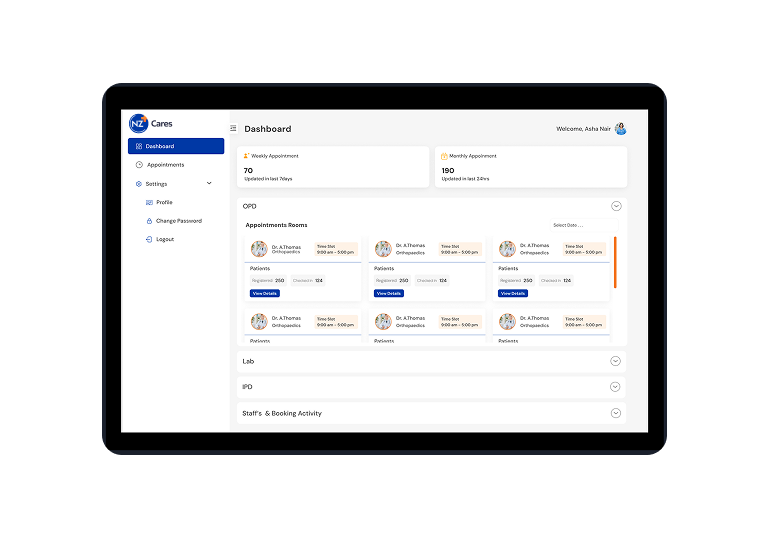Explore the digital revolution of pharmacy information system—anticipate reduced compliance risks, optimized inventory, and dramatically improved patient satisfaction.
The pharmacy sector is in the midst of a fundamental revolution. Heightened patient expectations, mounting regulatory demands, and ongoing inefficiencies are compelling the call for a radical transformation toward a more digital and efficient way of working.
This blog will discuss the most important challenges to the pharmacy sector, the smart technology innovations driving change, and the advantages of digital change with smart pharmacy information system.
The Pharmacy Information System Project’s Biggest Challenges: Why Change is Inevitable
The pharmacy world is up against several major problems that make a strong case for smart technology—much like hospitals leveraging Hospital Management Systems (HMS) to streamline processes, pharmacies must also adopt integrated solutions to overcome inefficiencies and deliver enhanced patient care.
1. Medication Errors & Patient Safety Risks
Old-school methods in pharmacies, like prescriptions written by hand and human slip-ups when giving out meds, can cause pricey errors. Mistakes with drugs put patients in real danger often causing bad reactions, hospital stays, or even deaths.
2. Inventory Mismanagement
Overstocking, stockouts, and wastage are common issues in pharmacies. Without real-time inventory management, pharmacies can suffer from financial losses, inefficiencies, and disrupted patient services. Stock mismanagement can also lead to medications being unavailable when patients need them the most.
3. Regulatory Compliance Complexity
The pharmacy industry is subject to complex and constantly evolving regulations. Pharmacies must adhere to stringent rules regarding medication storage, handling, reporting, and dispensing. Failing to comply with these regulations can result in fines, operational delays, and reputational damage.
4. Long Wait Times & Inefficient Workflows
Patients often experience long wait times due to manual prescription handling, billing, and administrative tasks. Slow workflows can frustrate customers and lead to decreased satisfaction.
5. Lack of Integrated Data
Disconnected systems prevent pharmacists from accessing essential information in real-time. A lack of integration between prescription databases, patient medical history, and insurance information makes it difficult to provide comprehensive care and process claims efficiently.
What’s the Solution?
The answer lies in smart technology that integrates and automates workflows, enhances compliance, and improves both efficiency and patient care. By implementing a smart pharmacy information system, pharmacies can overcome these challenges and position themselves for success in the future.
Smart Technology That’s Reshaping Pharmacy Operations
Pharmacy operations are being radically transformed by the advent of smart technologies. Here are the key innovations reshaping the industry:
1. AI & Automation: Reducing Errors, Increasing Efficiency with Pharmacy Information System
AI and automation are revolutionizing healthcare by dramatically reducing human errors and maximizing operational efficiency—highlighting the critical importance of selecting the right hospital management software. With advanced AI guiding data analysis, diagnostics, and personalized care, integrating a powerful HMS can amplify these benefits, streamlining administrative workflows, optimizing resources, and ultimately delivering unparalleled patient care.
Together, they allow healthcare professionals to focus more on patient care, improving outcomes and reducing costs.
- Predictive Analytics for Demand Forecasting and Real-Time Inventory Tracking:
AI-powered systems enable pharmacies to predict demand patterns and optimize inventory levels in real-time. This reduces the likelihood of stockouts and overstocking, ensuring medications are always available when needed. - Automated Prescription Verification to Reduce Errors and Fraud:
Automated prescription verification systems use AI to cross-check prescriptions against medical records, reducing the likelihood of dispensing errors or fraud. This system can quickly identify any discrepancies between prescribed and dispensed medications.
2. E-Prescriptions & Digital Workflows: From Paper to Precision
E-prescriptions and digital workflows are quickly replacing traditional paper-based methods, bringing greater accuracy and speed to pharmacy operations. With e-prescriptions, the common issues linked to illegible handwriting are eliminated, ensuring patients receive the correct medications every time. Additionally, digital workflows simplify administrative duties, enhance internal communication, and create smoother healthcare experiences. As discussed in our previous article on how clinics can effectively increase patient flow, adopting these digital strategies can significantly improve clinic efficiency and patient satisfaction.
- Seamless Integration Between Doctors, Pharmacists, and Insurers:
E-prescriptions allow for the seamless exchange of information between doctors, pharmacists, and insurance companies. This eliminates paper-based processes, speeds up prescription approval, and reduces the potential for errors or misunderstandings. - Faster, Error-Free Prescriptions with Automated Approval and Alerts:
Digital workflows help streamline the prescription approval process by automating alerts and notifications, ensuring prescriptions are processed quickly and accurately. Patients benefit from faster service and fewer delays in receiving their medications.
3. Telepharmacy & Virtual Consultations: The Future of Patient Access
Telepharmacy and virtual consultations are expanding access to healthcare services. Through telepharmacy, patients can consult with pharmacists remotely, while virtual consultations allow for medical advice without in-person visits.
These technologies improve convenience, reduce wait times, and provide more flexible care options, especially for those in underserved areas.
- Remote Prescription Approvals and Consultations for Better Accessibility:
Telepharmacy allows pharmacists to approve prescriptions remotely and offer virtual consultations to patients. This service is particularly beneficial for patients in rural or underserved areas, as it improves access to healthcare. - Home Delivery Services Powered by Automated Order Management:
Automated order management in pharmacy management system can facilitate home delivery services for patients, making it easier for them to receive their medications without having to visit the pharmacy physically.
4. IoT & Wearable Integration: Real-Time Patient Monitoring
IoT and wearable devices enable real-time patient monitoring by tracking vital signs like heart rate and blood pressure. This continuous data helps healthcare providers manage chronic conditions, intervene early, and create personalized treatment plans.
Wearables improve patient care by ensuring ongoing health monitoring and proactive management.
- Smart Pill Dispensers and Wearable Medication Adherence Trackers:
IoT devices, such as smart pill dispensers and wearable medication adherence trackers, can help ensure patients take their medications as prescribed. These devices can send real-time alerts to pharmacists and caregivers when doses are missed or need to be refilled. - Remote Alerts for Missed Doses or Refills:
Through IoT technology, pharmacists can receive notifications when a patient misses a dose or needs a medication refill. This improves medication adherence and helps pharmacists provide proactive care.
What Does This Mean for Pharmacies?
The integration of smart technologies allows pharmacies to streamline operations, reduce errors, enhance compliance, and improve patient care. As a result, pharmacies will be better equipped to meet the demands of the modern healthcare landscape.
How NZCares is Powering the Smart Pharmacy Revolution
NZCares’ pharmacy information management software is designed to streamline operations and integrate multiple pharmacy functions into one platform. Here’s how NZCares is helping pharmacies thrive in this digital age and build the future scope of pharmacy information management system:
NZCares’ Smart Pharmacy Management Features:
-
Automated Prescription Processing:
By reducing manual errors, NZCares ensures that prescriptions are processed quickly and accurately. -
Real-Time Inventory Tracking:
NZCares’ inventory management features prevent stock shortages and wastage by offering real-time tracking of medications. -
E-Prescription & Telepharmacy Integration:
NZCares allows pharmacies to quickly fulfill prescriptions and provide virtual consultations to patients, increasing accessibility and convenience. -
Compliance & Audit Readiness:
NZCares helps pharmacies stay compliant with automated reporting and tracking features, making audits a breeze. -
Smart Analytics Dashboard:
NZCares offers a data-driven approach with advanced analytics that helps pharmacies make informed decisions about resource allocation and business growth.
NZCares provides a one-stop solution for pharmacies, integrating pharmacy management, hospitals, and telemedicine in a seamless system. With AI-powered insights and interoperability with existing healthcare systems, NZCares makes the transition to smart pharmacy management easy and effective.
The Future of Pharmacy: What’s Next?
The future of pharmacy is bright, with advancements in technology continuing to push the boundaries of what’s possible. Here’s a glimpse of what’s to come:
- Hyper-Personalized Medicine: AI-driven systems will provide personalized medication dosages based on a patient’s unique medical history and genetic profile.
- AI Chatbots & Virtual Assistants: These tools will automate prescription requests and customer service, improving efficiency and accessibility.
- Autonomous Pharmacies: Robotics may take over prescription handling, allowing pharmacies to operate with little to no human intervention.
- Expansion of Telepharmacy: As telemedicine continues to grow, remote prescription dispensing will become the standard service, providing greater patient access to medications and consultations.
The Business Case for Smart Pharmacy Management
Pharmacies that adopt smart technology will see significant operational improvements. Here’s why investing in digital transformation is essential:
Key Benefits of Smart Pharmacy Management:
- 40% Reduction in Medication Errors with Automated Verification: By automating prescription verification, pharmacies can reduce medication errors by up to 40%, enhancing patient safety and reducing liability risks.
- 30% Faster Prescription Processing Through Digital Workflows: Digital workflows can speed up prescription processing by 30%, reducing wait times for patients and improving overall efficiency.
- 25% Higher Patient Retention Due to Seamless Service: With faster and more accurate service, pharmacies can retain more patients, resulting in higher customer satisfaction and loyalty.
- 50% Fewer Compliance Issues with Automated Tracking & Reporting: Automated tracking and reporting help pharmacies stay compliant with regulatory requirements, reducing the risk of fines and audits.
- 35% Improvement in Inventory Optimization, Reducing Losses: With real-time inventory tracking and predictive analytics, pharmacies can reduce losses due to stockouts or wastage by 35%, improving profitability.
How This Impacts Real-World Pharmacy Operations:
Pharmacies can process more prescriptions per hour, leading to increased revenue.
Staff can focus more on patient care, improving customer satisfaction and service quality.
Regulatory audits become easier to manage with automated compliance tracking, reducing stress and administrative overhead.
The Result?
By embracing smart pharmacy management systems, pharmacies can become more scalable, profitable, and patient-centric, positioning themselves for long-term success.
The Takeaway?
Pharmacies that embrace digital transformation today will lead the industry tomorrow. Those who invest in smart technologies will be able to meet patient needs, increase operational efficiency, and stay ahead of the competition.
FAQs
What is a pharmacy information system?
A pharmacy information system is software that streamlines pharmacy operations, including inventory management, prescription processing, and regulatory compliance.
What is the management of a pharmacy?
Pharmacy management involves overseeing day-to-day operations, such as medication dispensing, inventory control, patient safety, and regulatory compliance.
What is a pharmacy PMR system?
A Pharmacy Patient Medication Record (PMR) system is a tool used by pharmacies to maintain patient records, including prescriptions, medical histories, and medication adherence.
What system is used in pharmacy?
Pharmacies use various software systems, such as pharmacy information systems (PIS) and pharmacy management systems, to automate and optimize operations.
Conclusion: It’s Time to Future-Proof Your Pharmacy
The pharmacy industry is rapidly evolving, and digital transformation is no longer optional.
it’s a necessity. With the help of smart technology, pharmacies can improve efficiency, reduce errors, and enhance patient care. NZCares is at the forefront of this revolution, offering a comprehensive pharmacy management system that integrates automation, compliance, and patient-centric innovations. Now is the time to embrace smart technology and redefine how pharmacies operate for a future that’s efficient, profitable, and patient-focused.
Let’s build a smarter, more connected healthcare system—starting with your hospital.

